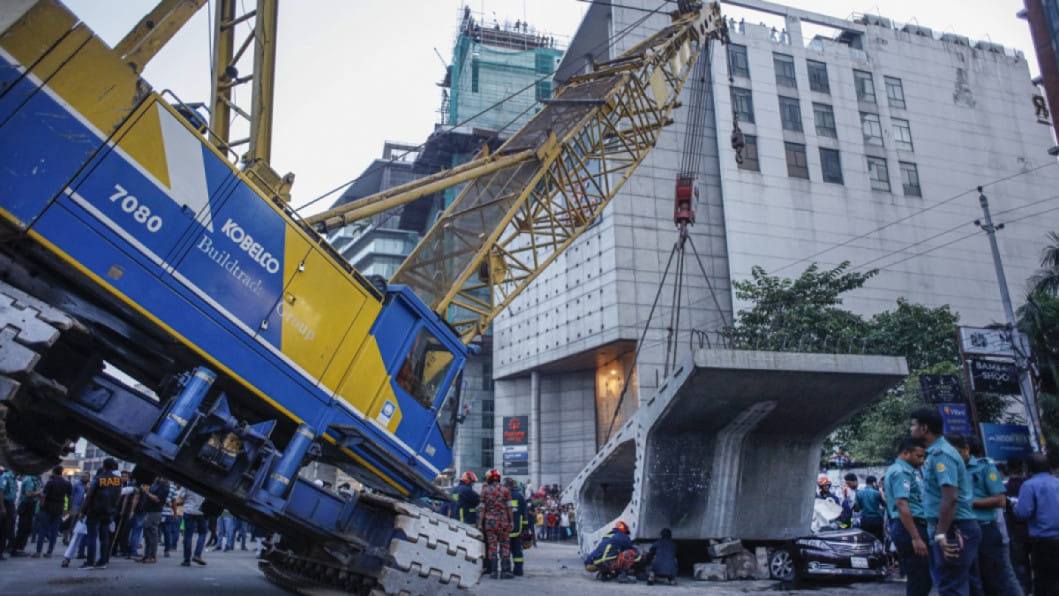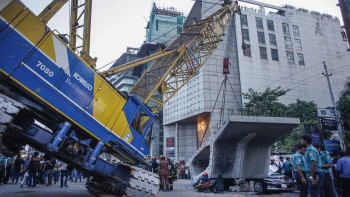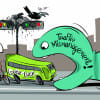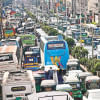Something is rotten in the state of things

If wishes were horses, beggars would ride. If wishes were fishes, we would all swim in riches. Yet wishes are all that we have.
When our city fathers assumed their offices in 2020, they presented their visions of a smart city. They shared their pre-election plans to excite our wish list. Now and then, they meet in convention centres and star-studded hotels to offer us various alphabetic soups brewed with further visions and strategies to support their dream. We, Dhakaites, await the day when all will be "smart" without being "smarted" daily. Our wishes neither ride nor swim.
Things are so desperate that newsmen receive anonymous phone calls from an on-duty transport official with a plea to do something about the traffic tailback on the Dhaka-Mymensingh highway that reached Banani flyover from Tongi's Millgate. This happened on Wednesday following the onslaught of cyclone Sitrang. The perennial pain caused by the elevated expressway, BRT and MRT achieved new heights when the extra downpour inundated many parts of the roads. Hours of waterlogging damaged their upper crust, resulting in many potholes. Traffic slowed down. Those responsible for controlling traffic felt helpless against the negligence of the city authorities who failed to clear the drainage, remove various roadblocks, including fallen trees and debris, curate construction sites and stop the narrowing of the roads for a host of reasons. Why the road veneer did not last long is another question that we dare not ask.
The woes of the city are well known. I won't trouble you by repeating the obvious. What intrigues me is that phone call stating a problem by a man who is both a solution and a part of the problem! The traffic sergeant wished that a news report would draw attention to the issues that he is failing to address through his line authority. The anonymity of the call, however, suggests how gagged the system is. The muted voice desperate to find a speaker through a newspaper is symbolic of our pent-up frustrations and tension.

The shelf-life of the projects to ease the trouble of commuters has doubled, and the cost quadrupled. In August, a fallen girder killed five passengers in a car, and the construction of BRT was stalled by the mayor. An initial investigation found the Chinese firm guilty of severe negligence, but a fault in the contract makes the firm entitled to a counterclaim. No penalty can be imposed because of our lack of judiciousness in signing the contract.
The contracts are in favour of the overseas firms, since we failed to secure our national interests. With allegations of commissions being shared, one wonders why these construction firms can remain so oblivious to our local causes! Clearing the adjacent areas next to the pillars, securing the sites with protective gear, night lights and hazard signage, and creating bypass or alternative routes are no-brainers. How can massive constructions take place on the busiest of roads without any care for the daily commuters? And if a man in uniform, in charge of maintaining the site feels helpless in this scenario, then there sure is a problem.
I can only assume that this situation is aggravated by many non-technical civil servants making technical decisions. There are many news items to support my suspicions. The general understanding is even policymakers are handcuffed to bureaucrats, particularly to those from the administrative cadres. The recent story of luxury housing for two civil servants is a case in point.
At a time, when the head of the state urges all to maintain austerity, warns us of a food shortage, and starts saving to brace against the global recession that is looming large, we hear the topmost civil servants wishing for a dream house worth 43 crore taka decked with multiple swimming pools and large-screen TVs. Their luxury is planned at the expense of our misery. The irony is, the top bureaucrats, who fail to secure our national interests, have no qualms in claiming the larger share of the development pie for themselves.
This is the kind of top-heavy administration that Bangabandhu resisted throughout his political career. As early as May 28, 1948, in a meeting of the Progressive Muslim League, the young student leader Sheikh Mujibur Rahman demanded that "the salary of the chief secretary should be reduced to Rupees one thousand and those of MLAs and Ministers should be reduced to make provisions for the enhancement of pay of all ill-paid officers [and primary teachers]". This reveals Bangabandhu's reservations against the top-heavy nature of the administration. Ironically, we pursued Bangabandhu's vision without understanding his spirit.
When a police officer reaches out to journalists to get administrative traction, we are reminded of a system where the upper echelon has lost touch with its foundational base. Thanks to their inefficiency and greed, megaprojects have now become a source of public derision. There is hardly any effort to explain the details to the stakeholders. They are presented as a development mantra where issues of affordability, sustainability and accountability are kept in the dark, which allows tales of second homes of government officials abroad to flourish.
On Thursday, two minor news items were published. One serving government official was arrested for neglecting his parents, and another retired government officer for buying a three crore taka flat against a revealed asset statement of Tk 52 lakh. These are breadcrumbs compared to the types of misuse of power and mishandling of money that we constantly hear about. But if this is a warning shot for the personnel in charge of government projects, then we should hail these stories as a welcome move.
Potholes, flooded drains and unkept construction sites are signs of negligence by our public officials. They are symptomatic of the dark side of our administration. Unless these officials are "smartened", we will never have a smart city. For that, we need the office-holders and office-bearers to work together, not for self-gratification but for public satisfaction.
Dr Shamsad Mortuza is a professor of English at Dhaka University.

 For all latest news, follow The Daily Star's Google News channel.
For all latest news, follow The Daily Star's Google News channel. 










Comments